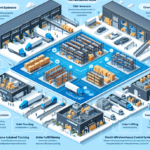Overview of Oracle Warehouse Management Cloud vs Infor CloudSuite WMS
Choosing the right Warehouse Management System (WMS) is crucial for optimizing supply chain operations. Oracle Warehouse Management Cloud and Infor CloudSuite WMS are two leading cloud-based solutions that cater to varying business needs. This comparison delves into their features, user experience, integration capabilities, pricing models, customer support, and scalability to help you make an informed decision.
Feature Set Comparison
Oracle Warehouse Management Cloud Features
- Comprehensive Inventory Management for real-time tracking and control.
- Wave Planning to optimize order processing.
- Replenishment strategies to maintain optimal stock levels.
- Advanced Analytics and Reporting tools for data-driven decisions.
Infor CloudSuite WMS Features
- Cross-Docking to streamline the transfer of goods directly from inbound to outbound.
- Pick-to-Light systems enhancing picking accuracy and speed.
- Task Interleaving for efficient task management and labor utilization.
- Integrated Voice-Directed Picking and automated storage solutions.
Both systems offer robust features, but the optimal choice depends on specific business requirements. According to a Gartner report, feature comprehensiveness and relevance to business operations significantly impact WMS effectiveness.
User Interface and Experience
The user interface (UI) plays a pivotal role in user adoption and operational efficiency. Oracle Warehouse Management Cloud boasts a clean, intuitive UI that offers real-time visibility into warehouse operations, facilitating quick decision-making. Its customizable dashboards allow users to tailor the interface to their specific roles and preferences.
Conversely, Infor CloudSuite WMS presents a more complex UI, which, while powerful, may require more training for optimal use. It provides extensive tools for managing warehouse tasks but can be overwhelming for new users. User experience studies, such as those from Forrester, highlight the importance of a user-friendly interface in reducing training costs and increasing productivity.
Integration Capabilities
Seamless integration with other systems is essential for a unified supply chain. Oracle Warehouse Management Cloud integrates effortlessly with other Oracle Cloud applications like Oracle Transportation Management and Oracle Order Management, facilitating a cohesive operational ecosystem.
Infor CloudSuite WMS offers robust integration with Infor's suite of applications, including Infor Supply Chain Planning and Infor Demand Planning. Additionally, it supports integration with third-party software through RESTful APIs and web services, enhancing its flexibility.
According to industry analyses, effective integration capabilities can reduce operational silos and improve data accuracy across systems (McKinsey & Company).
Pricing Models
Understanding the pricing models is critical for budget planning. Oracle Warehouse Management Cloud employs a subscription-based model, offering scalability based on warehouse size and feature needs. This flexibility allows businesses to adjust their expenditures as they grow.
Infor CloudSuite WMS utilizes a more complex pricing structure with various licensing options and add-on modules. While this can offer tailored solutions, it may complicate cost estimation for businesses.
Businesses should assess their long-term needs and financial constraints when evaluating these pricing models. Industry reports from Financial Times emphasize the importance of aligning software costs with strategic business goals.
Customer Support
Customer support is a key determinant of user satisfaction and system effectiveness. Oracle provides a dedicated support team available via phone and email, along with extensive online documentation and knowledge bases. Their support is renowned for responsiveness and expertise.
Infor also offers comprehensive customer support options, including phone, email, and online resources. However, some user reviews suggest that Infor's support may not always match Oracle's in terms of speed and effectiveness.
Effective customer support can significantly reduce downtime and enhance user experience, as highlighted in CustomerThink.
Scalability and Customization
Both systems are designed to scale with business growth, but they offer different levels of customization. Oracle Warehouse Management Cloud is highly scalable, supporting businesses of all sizes. Its extensive customization options allow businesses to tailor the system to their unique operational needs.
Infor CloudSuite WMS also supports scalability, particularly for mid-size to large enterprises. It offers customization through module add-ons and API integrations, though it follows a more standardized approach compared to Oracle.
Scalability and customization are essential for adapting to market changes and evolving business processes, as discussed in reports by Forbes Technology Council.
Reporting and Analytics
Robust reporting and analytics capabilities enable businesses to make informed decisions. Oracle Warehouse Management Cloud offers advanced reporting tools, customizable dashboards, and real-time analytics to monitor key performance indicators (KPIs) and drive strategic initiatives.
Infor CloudSuite WMS provides similar capabilities with real-time analytics, visualization tools, and customizable reporting. These features help businesses optimize warehouse operations and identify areas for improvement.
Data-driven decision-making is crucial for operational excellence, as underscored by studies from Harvard Business Review.
Final Considerations: Choosing the Right WMS for Your Business
Selecting between Oracle Warehouse Management Cloud and Infor CloudSuite WMS depends on various factors including business size, specific feature requirements, budget constraints, and integration needs. It is recommended to:
- Assess your warehouse processes and identify critical features.
- Evaluate the integration capabilities with your existing systems.
- Consider the total cost of ownership, including licensing, customization, and support.
- Request demos or trial periods to gain hands-on experience with each system.
By thoroughly evaluating these aspects, businesses can select a WMS that not only meets their current needs but also supports future growth and operational efficiency.






















